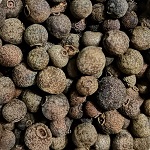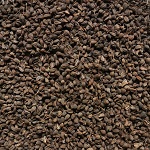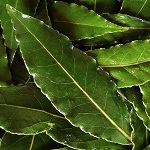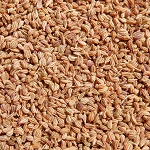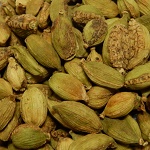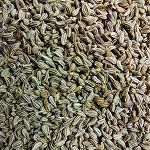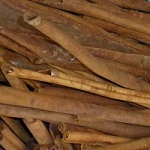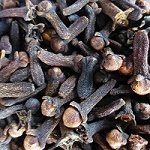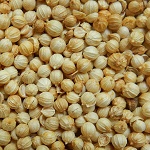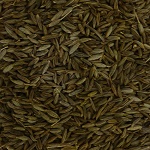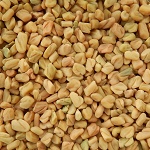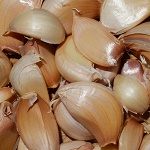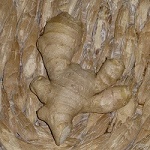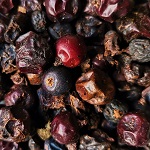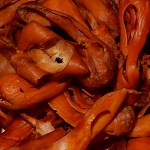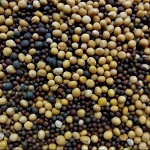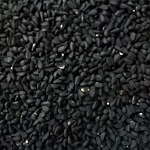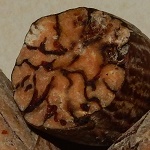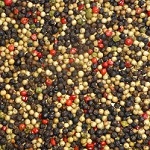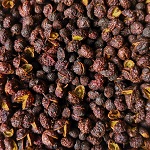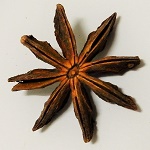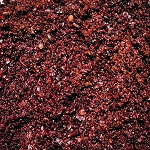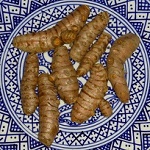Fennel seedAniseedyWarmingBittersweet
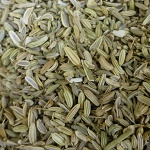
Fennel seedAniseedy Warming Bittersweet
The mild aniseedy flavor from anethole can enhance both sweet and savory dishes. Pungent fenchone adds its bitterness and the other minor flavor compounds give fennel seeds its citrus and pine like notes. Grinding the seeds will release the flavor and dry roasting will create new nutty pyrazine flavors.



Fennel seeds
Fennel seeds have a delicate taste that is slightly reminiscent of anise. Fennel seeds have many uses in lots of different dishes, fennel seeds are used a lot in the mediterranean cuisine, where it's used in pasta sauces, pizza's and when drying the salami sausages. Fennel seed is also an ingredient of the Chinese five-spice powder, a spice mixture containing fennel seeds, Sichuan pepper, cinnamon, star anise and cloves. In Indian cuisine, fennel seeds are also used a lot and after a meal the Indians often chew on fennel seeds to freshen their breath. That is why at Indian restaurants you will often get a saucer with fennel seeds with the bill. In the Middle Ages the people in Europe also chewed on fennel seeds, this to suppress their hunger while visiting the church.
Fennel seeds have been known for their medicinal properties for centuries, and fennel seeds are also a good source of many vitamins and minerals. Fennel seeds were originally used for all kinds of digestive problems. Fennel seeds reduce the formation of intestinal gasses, it helps relieve bloating and it has a soothing effect on the colon. Fennel seeds are also hunger-suppressing, antipyretic and analgesic, and traditionally fennel seed tea is given to children to drink as a tranquilizer.
Fennel seeds contains compounds that have almost the same effect in the body as the female hormone oestrogen. These compounds are called fyto-oestrogens. Fennel seeds give relief from symptoms associated with menstruation and menopause. The cramp relieving effect of fennel seeds also plays an important role in this effect.
Because fennel seeds contain these fyto-oestrogens the consumption of fennel seeds is not recommended during pregnancy. After birth, the fennel seeds are often used in a tea to stimulate milk production in nursing mothers. A tea made with fennel seeds is also widely used to reduce colic in babies. When the nursing mother drinks fennel tea, the healthy compounds end up in the breast milk. With slightly older babies you can give them the tea directly, possibly mixed with milk.
Fennel seeds also contain a good number of antioxidants such as kaempferol and quercetin. These compounds remove harmful free-radicals from the body and thus provide protection from all kinds of diseases like for example infections and cancer. The many fibres that the fennel seeds contain also provide protection against colon cancer.
You can use fennel seeds in many different dishes and it's also a very tasty ingredient for an herbal tea. Buy preferably whole fennel seeds because these contain their healthy compounds much better, and they also have a longer shelf life. Fennel seeds are easy grounded into a powder with a mortar and pestle.
Some health benefits of fennel seeds summarized:
Fennel seeds are a good source of the minerals calcium, copper, iron, magnesium, manganese, phosphorus, potassium and zinc.
Fennel seeds contain the vitamins A, B1, B2, B3, B6 & C.
Fennel seeds are a good source of dietary fibre.
Fennel seeds reduces the formation of intestinal gasses, relieves bloating and has a soothing effect on the colon.
Fennel seeds contain many antioxidants that give protection against infections, cancer and e.a. Alzheimer's disease.
Fennel seeds have hunger suppressing, antipyretic and analgesic effect.
Fennel seeds bring relief for women when they have hormonal problems.
Fennel seeds stimulate the milk production in nursing mothers.





